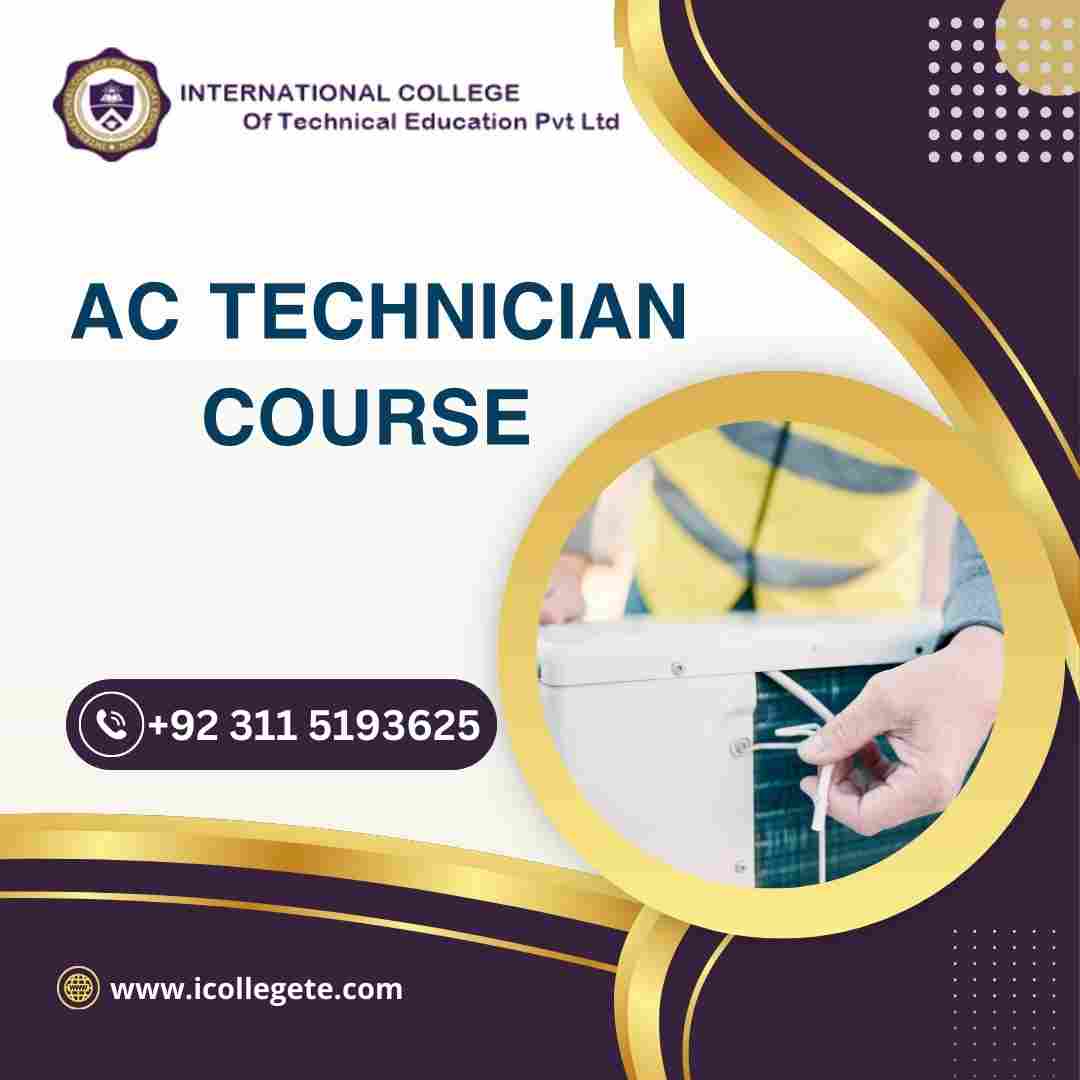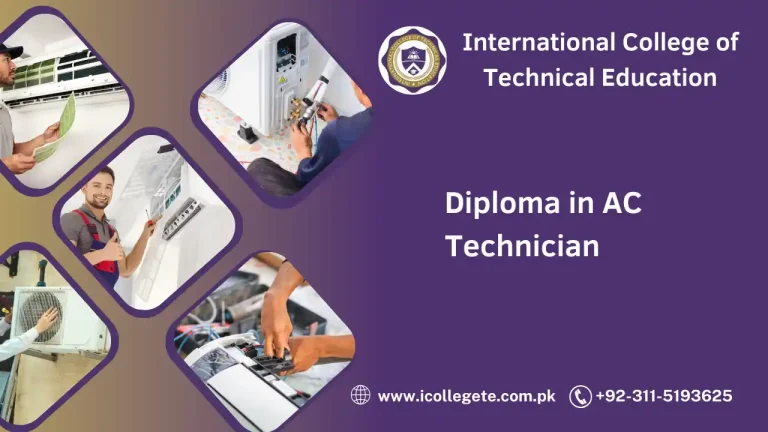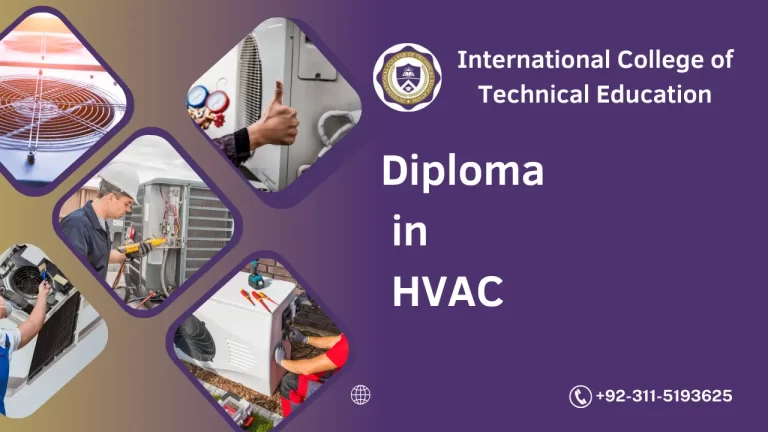The AC Technician Course is a comprehensive program designed to provide students with the knowledge and skills required to excel in the field of air conditioning and refrigeration technology. This course covers a wide range of topics, from basic principles to advanced techniques, allowing students to develop a solid foundation in AC systems and maintenance. Whether you’re looking to start a new career or enhance your existing skills, this course will equip you with the expertise needed to succeed in the industry.
Course Benefits:
Upon completing the AC Technician Course, students will benefit from:
- In-Demand Skills: The HVAC industry is constantly evolving, and skilled AC technicians are in high demand. Graduates of this course will possess the practical skills and theoretical knowledge needed to excel in the field.
- Job Opportunities: With the growth of commercial and residential construction, there is an increasing need for professionals who can install, maintain, and repair AC systems. This course opens doors to a variety of job opportunities.
- Hands-On Training: The course emphasizes hands-on training, giving students the opportunity to work with real AC systems and tools, ensuring they are well-prepared for practical challenges in the industry.
- Industry-Recognized Certification: Upon successful completion of the course, students will receive a recognized certification that validates their skills and expertise, enhancing their credibility in the job market.
- Career Advancement: For individuals already working in the HVAC field, this course can provide the additional knowledge and skills needed to advance in their careers and take on more challenging roles.
Course Learning Outcomes:
By the end of the AC Technician Course, students will be able to:
- Understand the fundamental principles of air conditioning and refrigeration technology.
- Install, maintain, and repair various types of AC systems, including split and central units.
- Diagnose common issues and troubleshoot AC system problems effectively.
- Demonstrate proficiency in using specialized tools and equipment for AC maintenance.
- Comply with safety regulations and industry best practices during AC installations and repairs.
- Analyze and evaluate the energy efficiency of AC systems and provide recommendations for optimization.
- Communicate effectively with clients and colleagues regarding AC system assessments and solutions.
Course Study Units:
- Introduction to HVAC Systems:
- Overview of HVAC technology and its importance.
- Basic principles of heat transfer and thermodynamics.
- Components of an AC system and their functions.
- Refrigeration Cycle and Components:
- Understanding the refrigeration cycle.
- Compressors, condensers, evaporators, and expansion valves.
- AC System Installation:
- Preparing for AC system installation.
- Proper sizing and placement of AC units.
- Installation procedures and techniques.
- AC System Maintenance and Repair:
- Routine maintenance tasks and schedules.
- Identifying and diagnosing common AC system issues.
- Hands-on repair techniques and strategies.
- Electrical Fundamentals for AC Technicians:
- Basic electrical principles.
- Wiring and circuit diagrams for AC systems.
- Safety precautions when working with electricity.
- Energy Efficiency and Environmental Considerations:
- Importance of energy-efficient AC systems.
- Refrigerant types and their environmental impact.
- Strategies for optimizing AC system efficiency.
- Safety Practices in HVAC Work:
- Occupational health and safety guidelines.
- Personal protective equipment (PPE) and safe work practices.
- Handling hazardous materials and refrigerants.
- Customer Service and Communication Skills:
- Effective communication with clients and colleagues.
- Providing clear explanations of AC system issues and solutions.
- Addressing customer concerns and ensuring satisfaction.
Entry Requirements:
To enroll in the AC Technician Course, applicants must meet the following requirements:
- High school diploma or equivalent.
- Basic understanding of mathematics and physics.
- Proficiency in English (reading, writing, and speaking).
- Strong mechanical aptitude and an interest in technical work.
Future Progressions:
After completing the AC Technician Course, graduates will have various options for future progressions:
- Entry-Level AC Technician: Graduates can start their careers as entry-level AC technicians, working with established HVAC companies to gain practical experience.
- Specialized Technician Roles: With experience, technicians can specialize in areas such as commercial AC systems, industrial refrigeration, or energy-efficient HVAC technology.
- Entrepreneurship: Some graduates may choose to start their own AC maintenance and repair businesses, providing services to residential and commercial clients.
- Advanced Certifications: Pursuing advanced certifications in specific AC technologies or systems can lead to higher-paying positions and greater responsibilities.
- Higher Education: Graduates interested in furthering their education can pursue associate’s or bachelor’s degrees in HVAC engineering or related fields.
Conclusion:
the AC Technician Course provides a comprehensive education in air conditioning and refrigeration technology, equipping students with the skills and knowledge needed to excel in the HVAC industry. With a focus on hands-on training, safety practices, and effective communication, graduates will be well-prepared for a rewarding career in AC system installation, maintenance, and repair. Whether you’re a recent high school graduate or a working professional seeking a career change, this course offers a pathway to success in a rapidly growing field.







